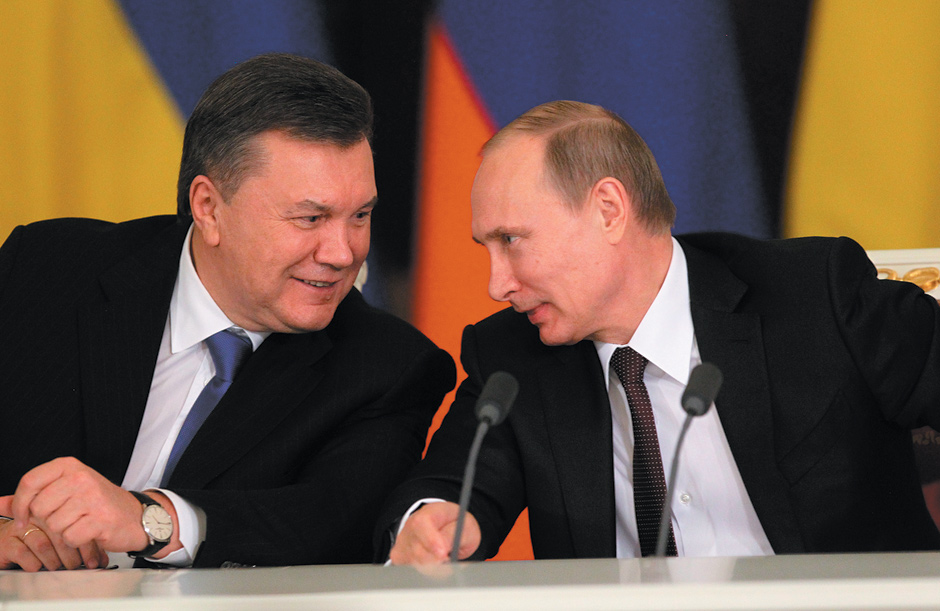On paper, Ukraine is now a dictatorship. President Viktor Yanukovych, in having the deputies of his Party of Regions endorse an extraordinary packet of legislation, has arrogated decisive political power to himself. After hundreds of thousands of Ukrainians spent weeks in the cold demonstrating for basic human rights and a stronger association with Europe, the president has responded with a violation of human rights and a rather sad imitation of Russia.
In procedure and in content the laws “passed” by the Ukrainian parliament in mid-January contravene the most basic rights of modern constitutional democracies: to speech, assembly, and representation. Although they concern the most fundamental aspects of political life and transform the constitutional structure of the Ukrainian state, these measures were not subjected to even the barest of parliamentary procedures. There were no public hearings, there was no debate in parliament, and there was no actual vote. There was a show of hands in parliament and an estimate of how many hands were raised. Photographic evidence indicates that rather few deputies actually raised their hands. The standard electronic voting system, which creates an official record, was not used at all.
The deputies—those who apparently raised their hands—have all but voted themselves out of existence. If the deputies from Yanukovych’s Party of Regions read the legislation, which according to Ukrainian reports they did not, they would realize that their own positions are now under threat. Their parliamentary immunity is now no longer guaranteed, which means that if they vote the wrong way they can be stripped of immunity and prosecuted. Yanukovych’s main political rival, Yulia Tymoshenko, is in prison. Her defense lawyer has already been stripped of the legal status conferred on him by parliament. The logic of the legislation is the end of parliamentary checks on presidential power.
Speaking at all about the Tymoshenko case will now be risky. Actions deemed to “interfere with the work of courts” have been banned. Making remarks of an “offensive” nature about judges is illegal. It seems unlikely that truth will be a defense. It is true, for example, that the new president of the highest Ukrainian court was once in charge of the court that misplaced documents about President Yanukovych’s earlier criminal convictions for rape and robbery. But that seems like exactly the thing that people will no longer be allowed to say. As far as Yanukovych’s own record is concerned, the new legislation’s vaguely worded ban on “slander” will presumably be used to make unfriendly references to the president a crime.
This, unfortunately, is only the beginning. Through remarkably large and peaceful public protests against the government beginning late last November, Ukrainians have set a positive example for Europeans these past few weeks. But it will now be illegal to violate government procedures for public gatherings. Since there are in fact no such procedures, any public gathering can be deemed against the law. It is now illegal to carry out “extremist activities,” which include expressing “extremist” views in print, on the Internet, and in phone conversations. Internet providers and phone companies are required to maintain records that will allow prosecutors to pursue such cases.
Perhaps the most disheartening new measure copies existing legislation in Russia concerning “foreign agents.” Organizations that receive any form of direct or indirect financial support from any source beyond Ukraine must stigmatize themselves by adding the term “foreign agent” to their names. They will also be required to publish regular public accounts of their activities and be subject to special taxes.
Naturally, it is impossible to do normal business, political or not, under these conditions. If such laws existed in the United States, my employer would be a “foreign agent,” since Yale University receives money from sources beyond the United States. So do the best universities in Ukraine, the Kiev Mohyla Academy and the Ukrainian Catholic University, whose existence is now under threat. So of course does the Catholic Church itself, whose future in Ukraine is now uncertain. The problem is general: the impressive revival of Jewish education and culture in today’s Ukraine is also funded from abroad.
In practice, will Ukraine become a dictatorship? Ukrainians have powerful reasons to resist. In the days after the legislation was signed by the president, peaceful protesters found creative ways to mock the new laws, while at the same time more and more young male protesters, defying the leaders of the political opposition, chose to attack the police. Representatives of a minor group of the Ukrainian extreme right have taken credit for the violence. Meanwhile reports from Ukraine indicate that those who led the attack spoke Russian. Since Ukrainian nationalists are the people who refuse to speak Russian, something is fishy. Perhaps Yanukovych is arranging for blame to be placed on native nationalists while the work is done by russophone provocateurs.
Advertisement
In any event, the people immediately arrested after the outbreak of violence on the night of January 19 were oppositionists who had nothing to do with the attack. This is standard procedure: use provocateurs to create the disorder and then blame and arrest members of the domestic opposition at your leisure. Whether or not the violence is desired by Yanukovych (or Putin), it cannot necessarily be controlled. Indeed, among the new laws is a universal pardon for the forces of order. No doubt many Ukrainians have simply had enough.
Where this will lead is anyone’s guess. But the stakes are very high. These laws end the Ukrainian republic as Ukrainians have known it. They are the laws of a president who knows he is too weak in his own society to win another election. They also much reduce the possibility—yearned for throughout the country—of Ukraine’s future integration into Europe. No one in Brussels or European capitals is going to lobby for a trade deal with a leadership that has explicitly chosen authoritarianism.
If these laws are allowed to stand, the future of Ukraine will thus be with Belarus and Russia, for lack of another option. President Yanukovych has accepted a loan of some $15 billion from Russia’s sovereign wealth fund, along with a reduction in the price Russia charges for natural gas. If there are conditions attached, which seems a reasonable assumption, they probably include ending Ukrainian protests before the Sochi Olympic Games begin. With Ukraine facing large debts, Russian money may make sense in the short run for Yanukovych, though it puts him on Putin’s leash. European trade makes sense for the country as a whole, in the long run.
Whether there will be a long run is now in question. In the past decade, Ukrainians have been among the most impressive defenders of their own rights. In the past weeks, they have been defending the idea of Europe, inspiring Europeans themselves. Will anyone outside the country defend civil society in Ukraine?
—January 23, 2014




